Part 2: Fé da Rainha

In the Ancient Era, Queen Maria heard the voice of God and His demand for glory and recognition, and that her people must demonstrate reverence towards Him, as He alone was responsible for bringing them into this world.

Thus, the people of Portugal were taught to recognize that they live, or die, succeed, or fail, entirely at His whim, and must work diligently to demonstrate their love for their God, lest He someday abandon them in the wilderness.
Thus, Dona Maria Primeira was thereafter known as Maria the Pious, who brought her people into the embrace of God, that they might grow and prosper under His watchful eyes.
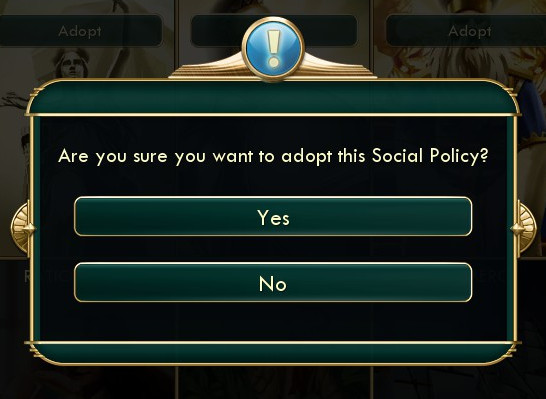
As Social Policies, unlike scientific advances or construction projects, are provided immediately upon selection, they cannot be taken back, so the game wants to make sure we are prepared to walk with God.
For everyone's reference, from this point forward the Policy bonuses are as follows, going from left to right, top to bottom.





Our fate thus decided, we return to the more secular matter of food production.

We move the Worker one tile and spend his remaining point of movement beginning the Tile Improvement process. As mentioned earlier, the Farm will provide one extra Food for the Wheat tile, but that will improve further with time and tech. As such, the two wheat provided to us makes for a strong starting point.

Meanwhile, up north, our Warrior goes to investigate the strange line further to the north, and finds something new:
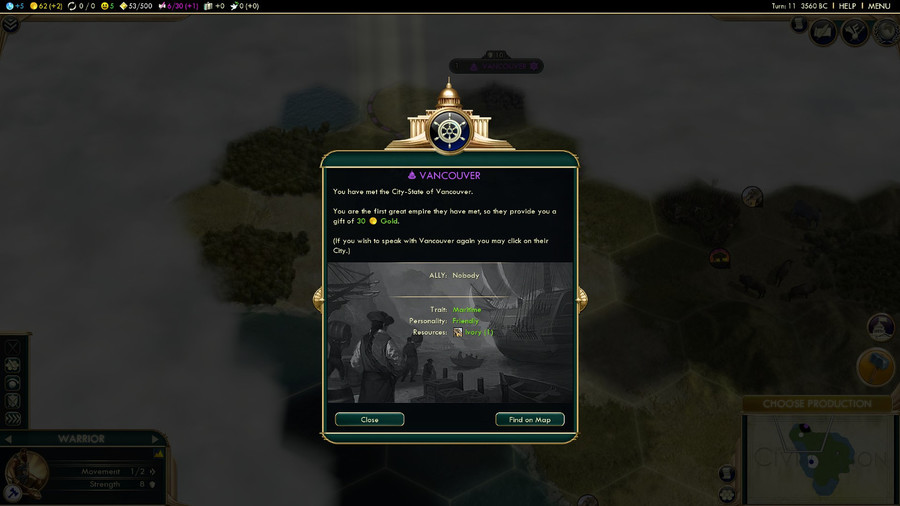
City-States are independent mini-civilizations based on large cities based in countries not already included in the game as Civs (
 ). The City-State has a Trait, a Personality, and a list of available Resources for trade.
). The City-State has a Trait, a Personality, and a list of available Resources for trade.City-States essentially work as fluid bonuses that can be provided to players that try to build up a relationship with them, indicated as an Influence score. Influence is earned through the completion of quests given from time to time by the City-State or the performance of certain actions, like eliminating nearby Barbarian units or giving the City-State gold or military units. At 30 influence, a City-State becomes a Friend and will grant a partial bonus based on its Trait, and access to its borders at no penalty. At 60 Influence it will become an Ally of the Civ with the highest Influence and grant a larger bonus, access to its Resources, and participate in wars on the side of its Ally. However, Influence decays over time so steps must be taken to maintain Ally status. Alternatively, you can go the antagonistic route and demand tribute from the City State in the form of Gold or Worker Units by intimidating them with a larger army, though this method provides shorter-term bonuses that are on the whole a little weaker than the Influence bonuses.
For the time being, we will let Vancouver do as they will since we do not have the means to increase Influence or demand tribute as of yet, but this will change with time.

We explore further west and hit more coastline, so at the very least we know we are likely on the westernmost part of the continent.
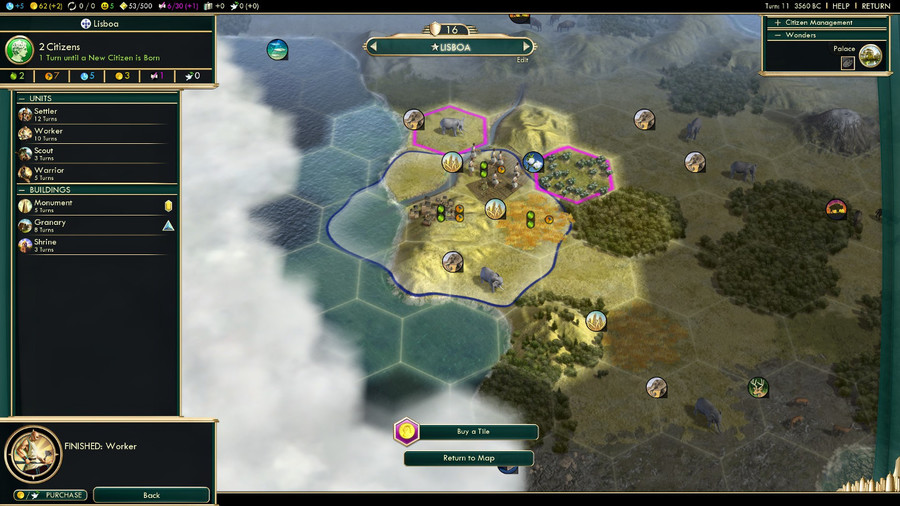
Back in Lisboa, our finished Worker has freed up the production queue, so we will use our newfound focus on Faith to construct a Shrine in a short time frame.
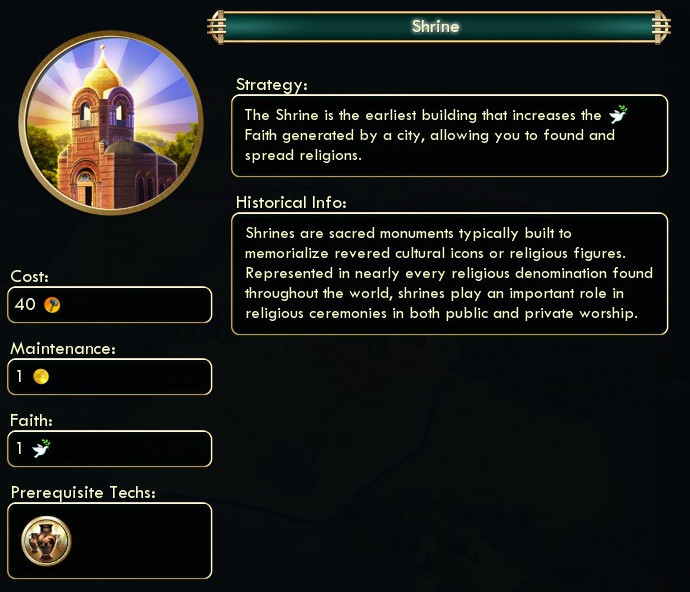
Buildings inside Cities provide bonus resources or traits to those cities, while typically having a maintenance cost associated with them as well. In this case, we will be paying 1 Gold per turn in exchange for 1 Faith per turn, and Faith will be necessary for us to develop a Pantheon, and eventually a Religion.
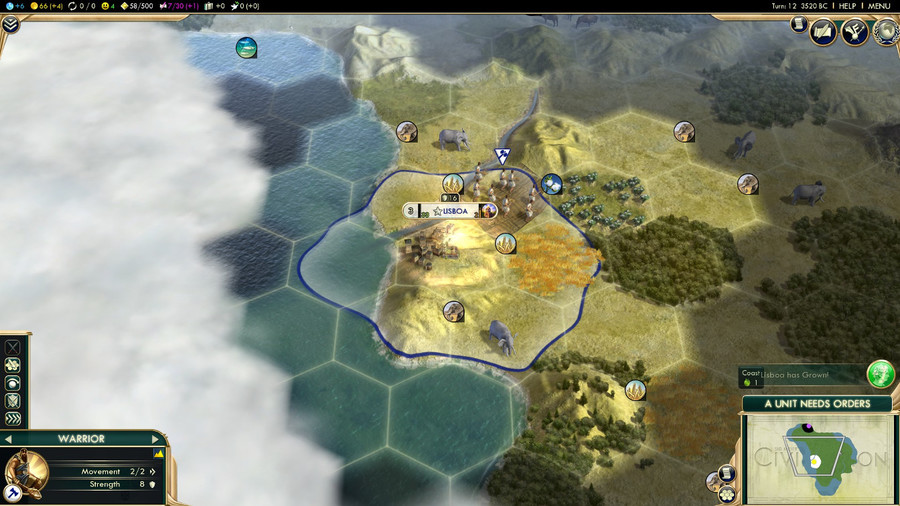
The turn passes, and Lisboa gains another Citizen thanks to our food stores.

At this time I will show off the Citizen Management overlay that we may find use for. Citizens in your city will always work tiles within your city borders (the green dots above each hex demonstrate which ones are being worked) and the game normally determines which tiles to work automatically, typically prioritizing food or tiles that provide unique bonuses such as Natural Wonders. However, we can also choose which tiles are worked using Citizen Management, which will be useful if we wish our cities to prioritize the production of certain types of resources.

Our Warrior returns east to check on the Barbarian units...
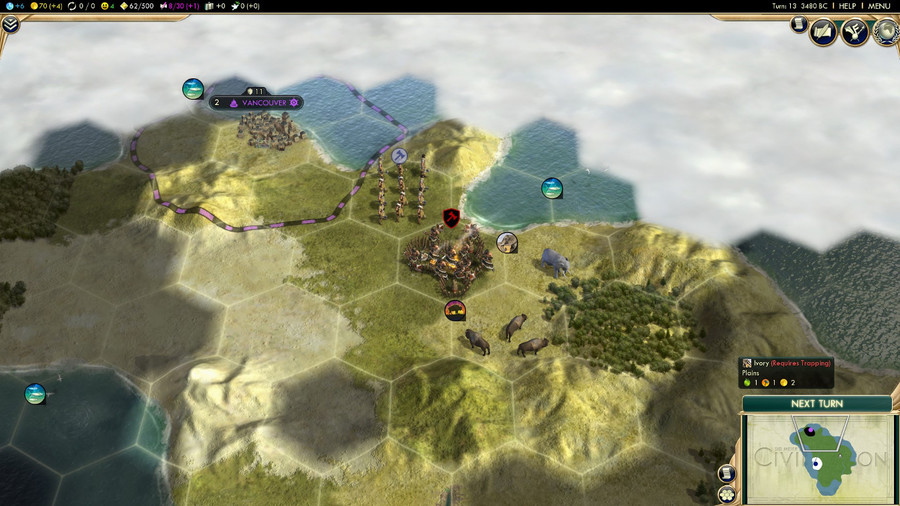
...and spends the next turn going north slightly to cut them off from direct access to Vancouver.

On the next turn, the Encampment spawns a second Brute unit which is free to move and wreak havoc, since it is not parked on the Encampment.
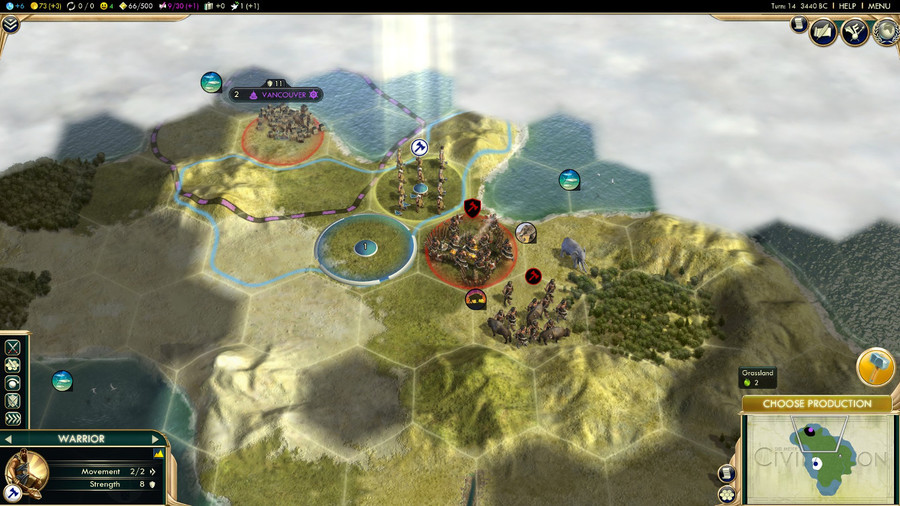
At this point I also demonstrate the Zone of Control that military units have. It is not possible to move more than one tile when moving from one tile to another within an enemy unit's Zone of Control, which are the unit's six adjacent hexes. As such, while the blue border demonstrates that we can move two tiles back, we cannot move two tiles around the enemy unit.
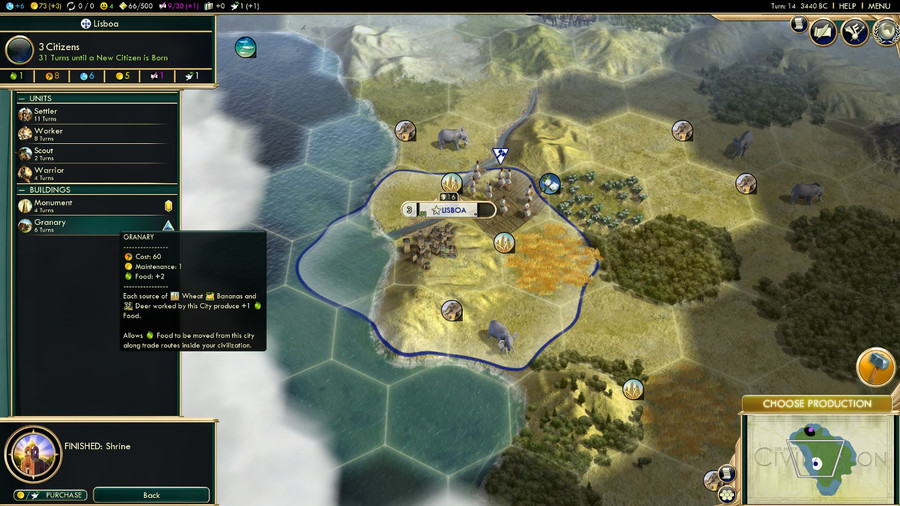
Back in Lisboa, our Shrine is done quickly, so we begin construction of a Granary in order to gain some support for our food.
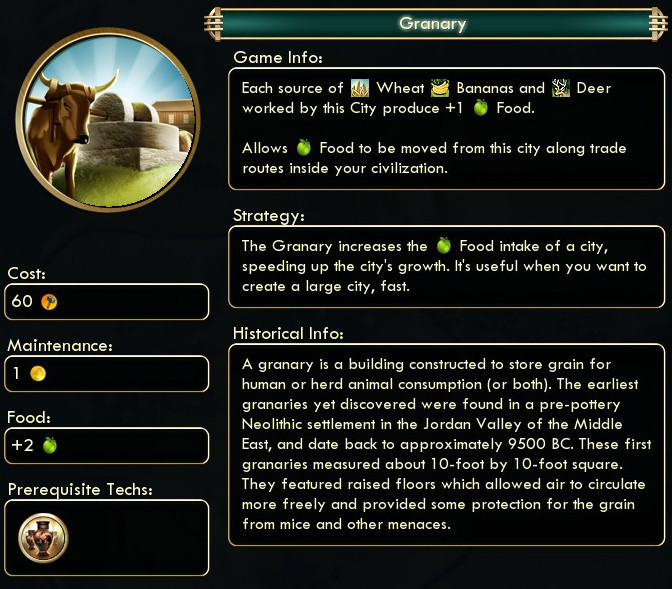
The most compelling reason to do so is the additional +1 food granted to tiles with wheat, meaning that between the Farm and the Granary, our Wheat tiles will have double their normal food yield.
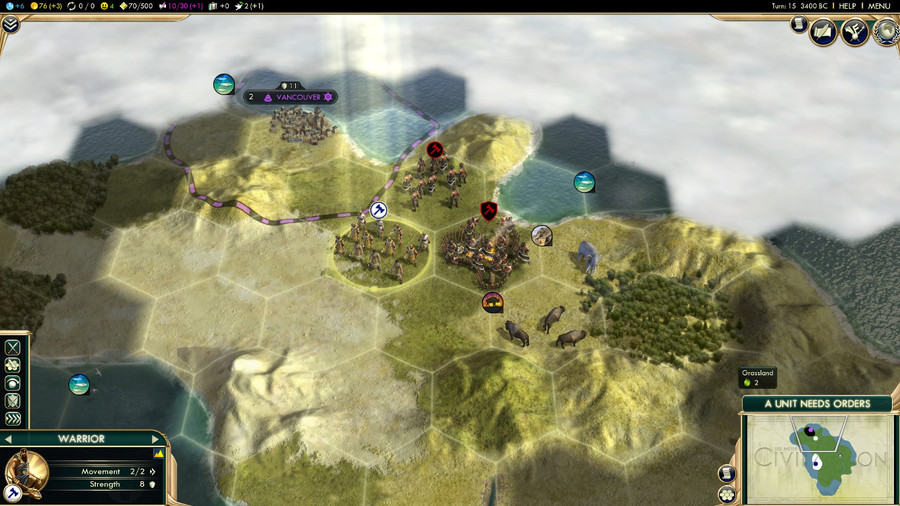
Outside Vancouver, the Barbarians have moved towards the City State, pillage and destruction on their minds. At this time, I will highlight the Warrior to talk a bit more about how Military Units function.
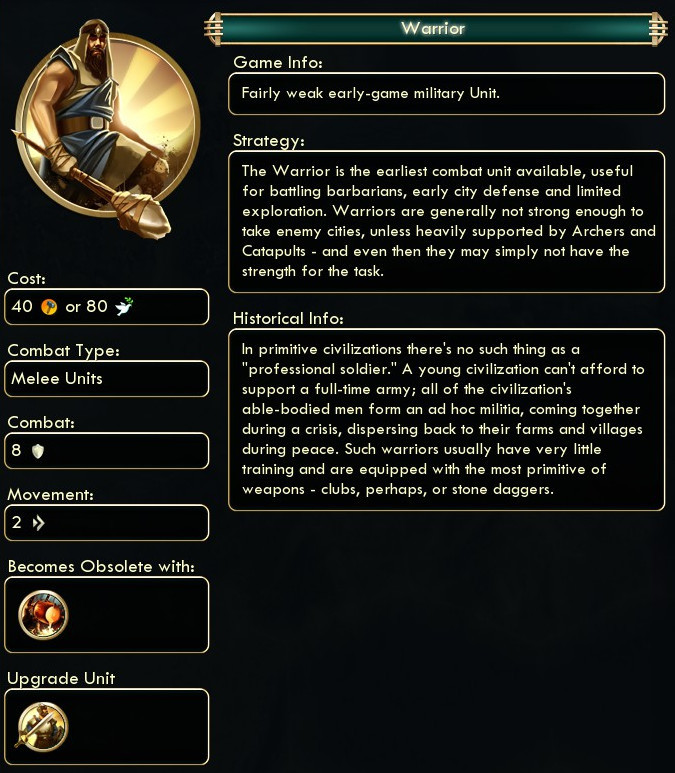
Military units' effectiveness is demonstrated by their Strength in melee. When two units engage each other, the difference between their Strengths, and a minor amount of RNG, will determine how much damage each unit takes from their 100 HP.
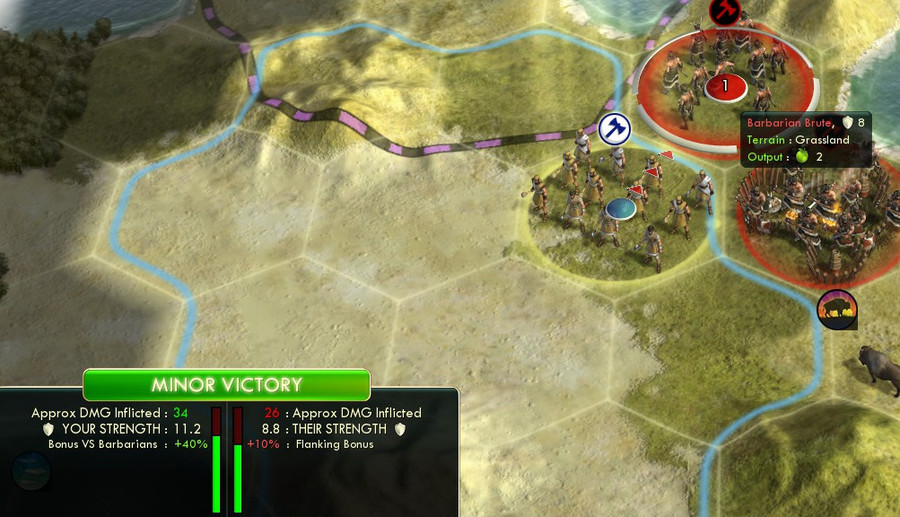
The zoomed-in view here shows the game's calculation of a combat result in the bottom left, as well as the modifiers applied to each unit's Strength based on circumstance. In general, units gain positive Strength modifiers for: Fighting Barbarians, fighting in terrain where they have a trained advantage, certain bonuses from Social Policies or Buildings, having adjacent allies threatening the enemy units (the "flanking" bonus) and taking a fortified stance across a river or in hilly or wooded terrain. Units lose Strength if their Civs have low Happiness or they are trying to take defensive positions on top of Resources.
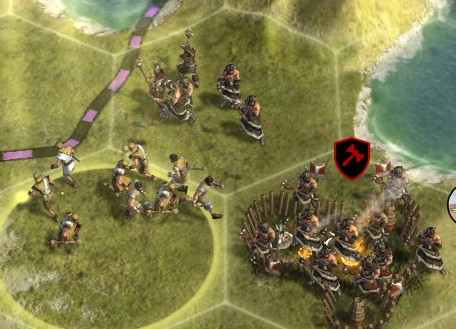
We decide to fight with the units we have, and a melee ensues.

When the dust clears, they have taken more damage than us, so we have the advantage.
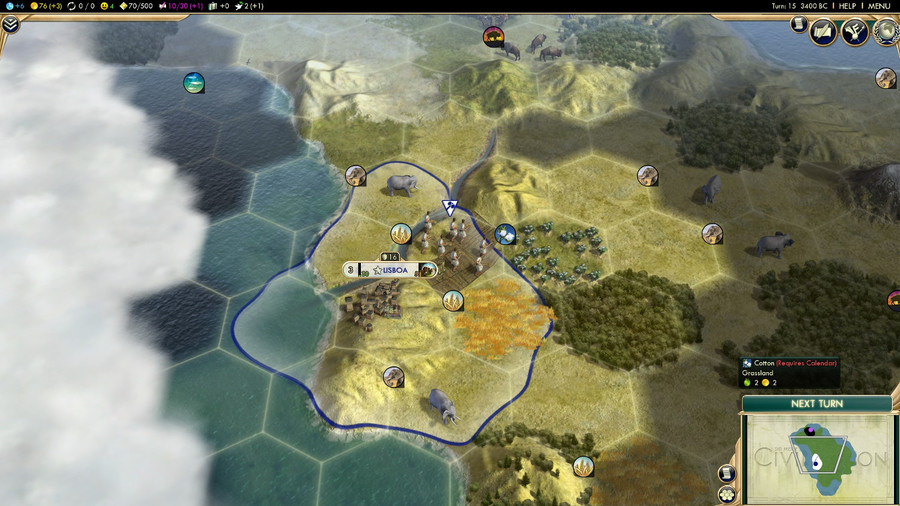
Back in Lisboa, our borders have grown to occupy the northernmost space, containing one of the Elephants. Borders grow as a function of the Cultural output of the city, and as our Cultural output is somewhat low, our borders will grow more slowly.
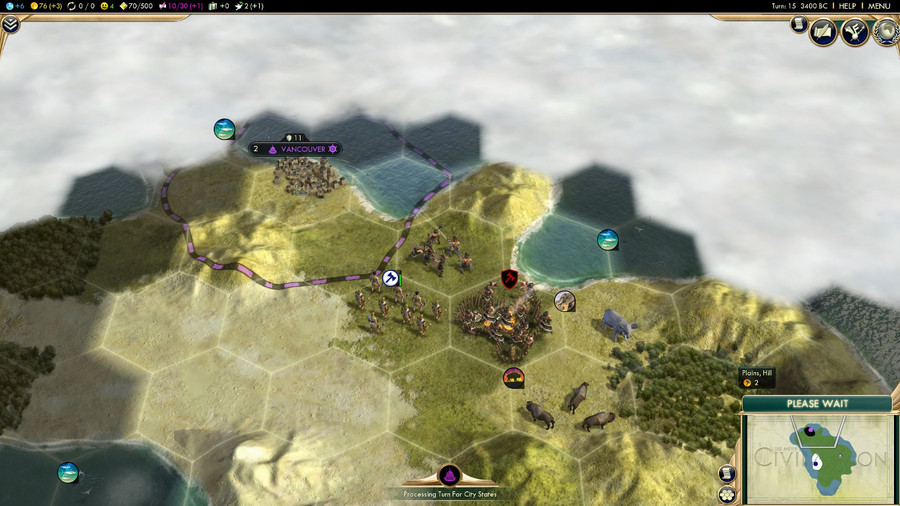
In Vancouver, the City-State decides to open fire on the nearby Barbarian, which it can do as Cities have a ranged attack they can use on enemy units within two tiles. The strength of the attack is based on the technology level of the Civ to which the City belongs, as well as factors like certain buildings and overall number of citizens.

The Barbarian moves in, but our Warrior will instead fortify for a turn and spend time to gain a defensive bonus and heal some of the damage from the previous engagement. That Barbarian is unlikely to do any damage to Vancouver in its state.

Back in Lisboa, our first Farm is done and we move the Worker to begin work on the second one, zooming in briefly to illustrate the visual difference between a hex with an improvement and a hex without one.
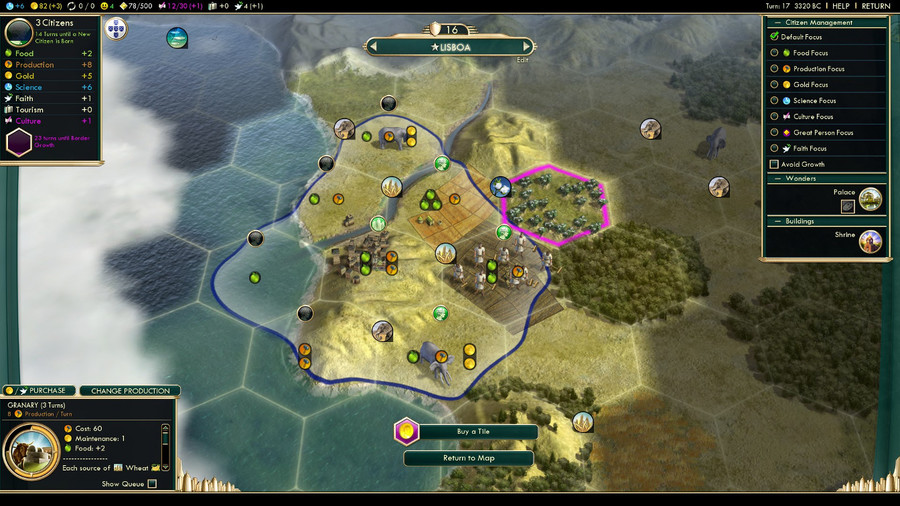
The City screen also shows us how we can expect the city borders to grow in the future (the purple hex), and approximately how many turns it will take to reach that point based on Culture. We also have the option of buying the border expansions with Gold, but that will have to wait until we have a bit more to spend.

As I anticipated, the Barbarians retreated after Vancouver fired again, and now they are in prime position to be finished off by the Warrior.

The Brute is wiped out, and the Warrior occupies its space.
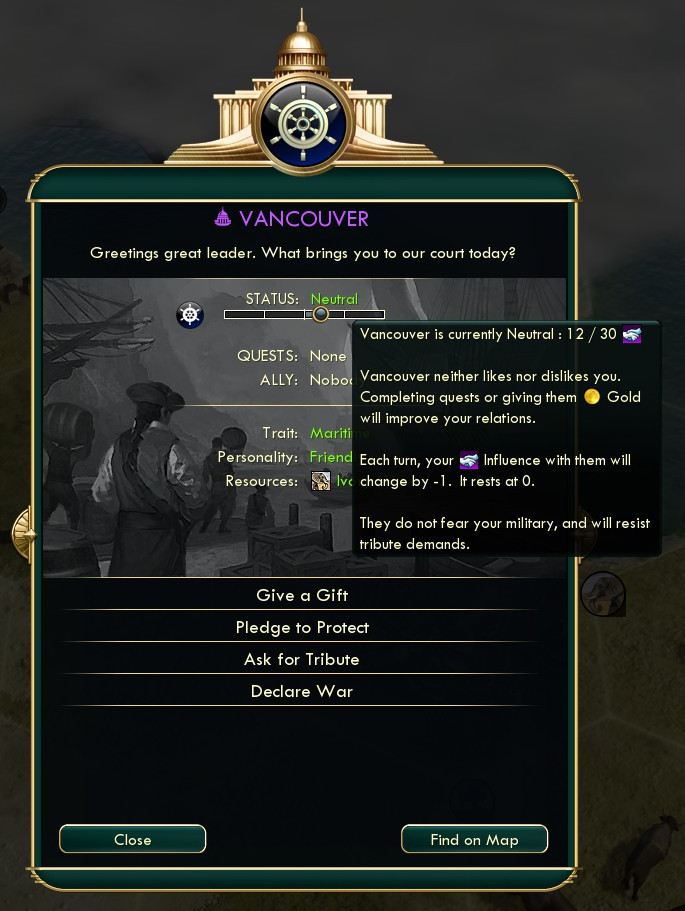
As we killed the Barbarian in a space adjacent to a City State border, we also gain Influence with them through our demonstration of strength.
Since we have gained this Influence, I opt to try to preserve it by offering a pledge of Protection, with the following effects:
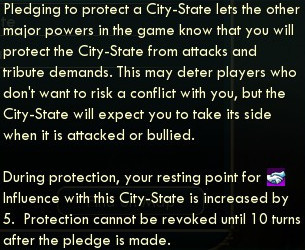
On our next turn, something new:

Our warrior has earned enough experience from Combat to gain a new perk in the form of a Promotion. Promotions for military units give a variety of situational bonuses based on a tree, and they become stronger the more frequently the unit is promoted. We can also opt to eschew a promotion in favour of instantly healing the unit by 50, which is another short-term advantage but long-term disadvantage.
Given the terrain surrounding Lisboa and the availability of Mt. Kilimanjaro, I decide to give the Warrior the Open terrain bonus, which gives him +15% Strength when fighting on flat terrain with no Forest or Jungles.
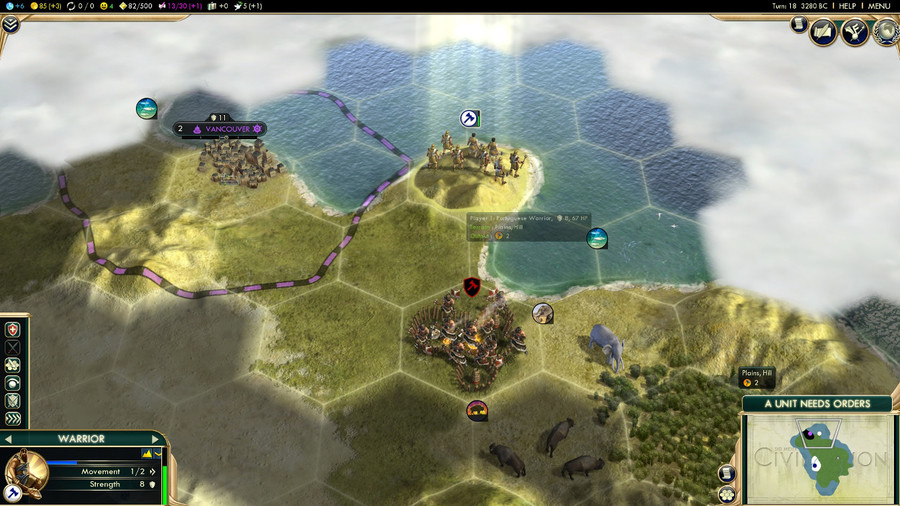
And then, in a bit of a foolish move, I also decide to move the Warrior onto the hills to the north to make absolutely sure we are on a peninsula.
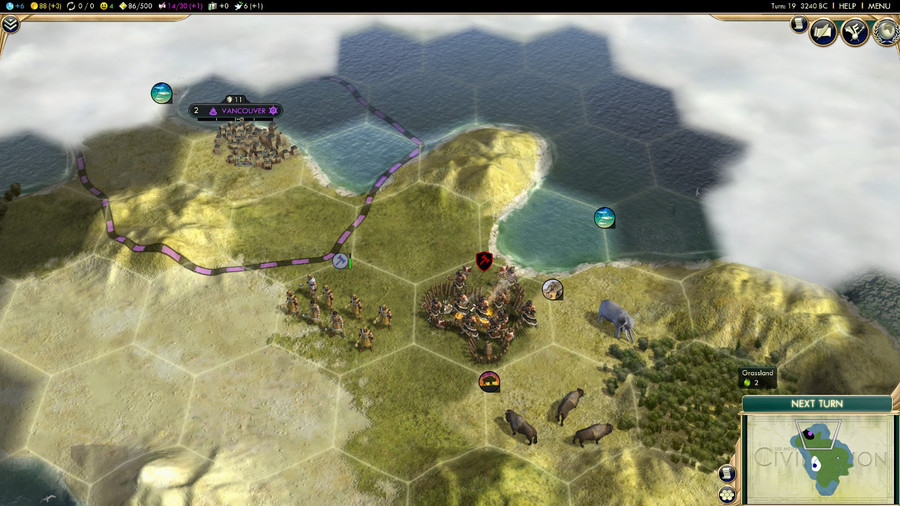
Thus, we begin moving back south (I can take two steps here because I was not in the enemy Zone of Control for the first step) to try to reinforce Lisboa, as I am a bit nervous about the Barbarians we spotted far to the southeast.
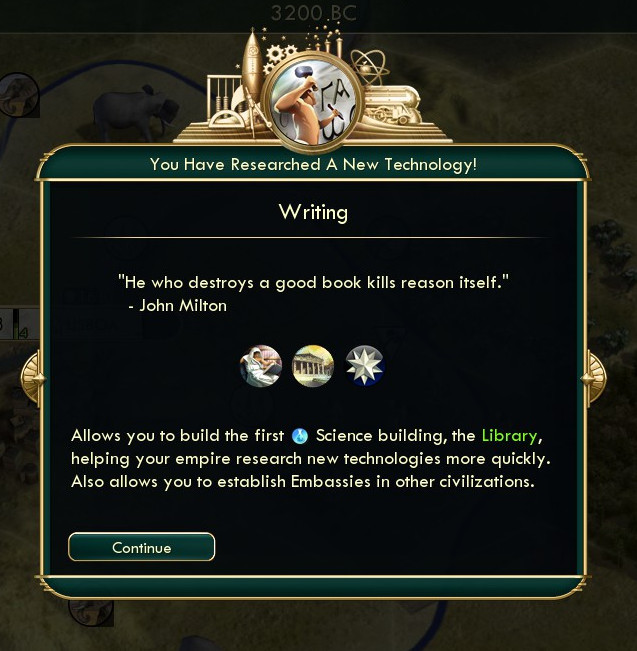
At this time, we have developed literacy in Lisboa, the better with which to spread the word of God.

This development gives us access to the Library, our first Science building...

...and its Great counterpart, which is our first Wonder.
Wonders are technological and social achievements on a scale that history only ever sees once, and many real-life locations and UNESCO World Heritage sites are reflected in the Wonders available in this game. The Great Library, as you can see in the description, gives significantly greater bonuses than a regular Library, but its Production cost is significant and, in the event that another Civ starts building faster than us, we stand to lose a lot of progress if we do not finish building it first, as only one of each Wonder can exist in the world at a time.
Keeping this in mind, I decide that Lisboa's efforts are better spent on the lesser Library, as the time to build great monuments to God will come later.
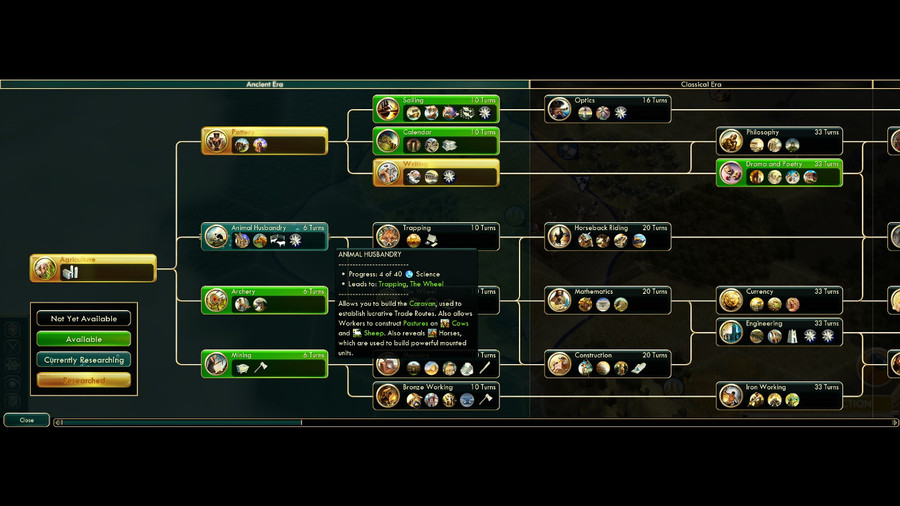
At this time, we also start researching Animal Husbandry, which will give us the benefit of access to new resources and trade caravans, which will soon allow us to start making use of our Unique Ability.
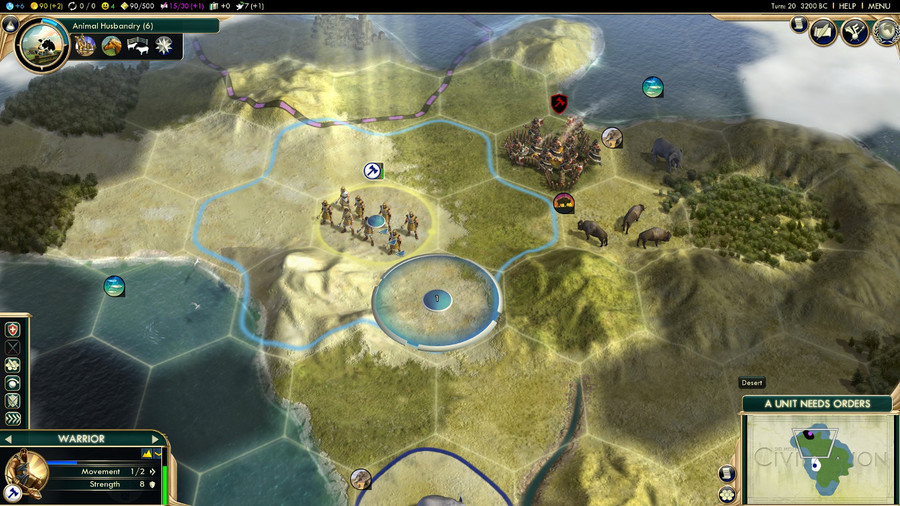
Per the earlier directive, we keep moving the Warrior south...

...and not a moment too soon, as a Barbarian Brute looms to the east of the Workers. Workers are not military units, so they are automatically captured by any enemy military units that moves into their space. I do not wish to lose the early advantage the Worker provides, so I take a preventive measure.
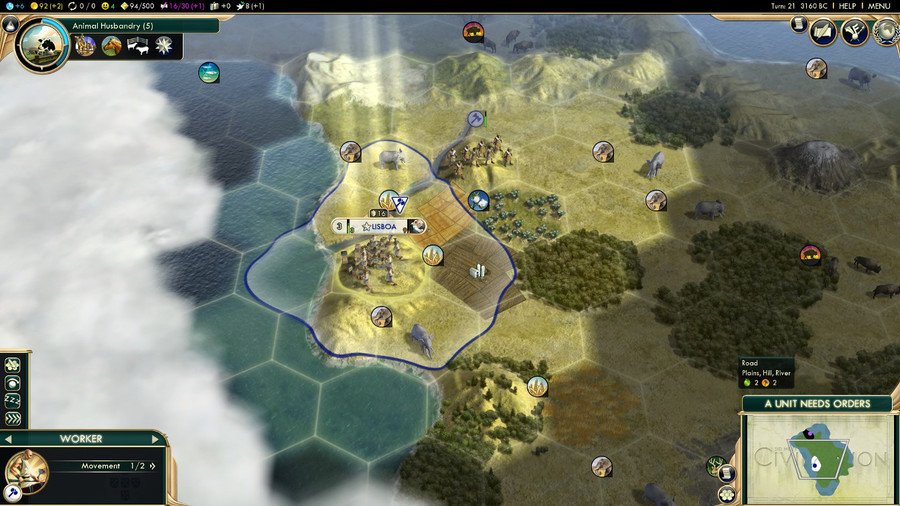
By moving the Worker onto Lisboa, it is now protected by the city, so the Brute will have to siege the city to get at the Worker. Furthermore, my Warrior is positioned well to move in if the Brute attempts an aggressive step towards Lisboa.
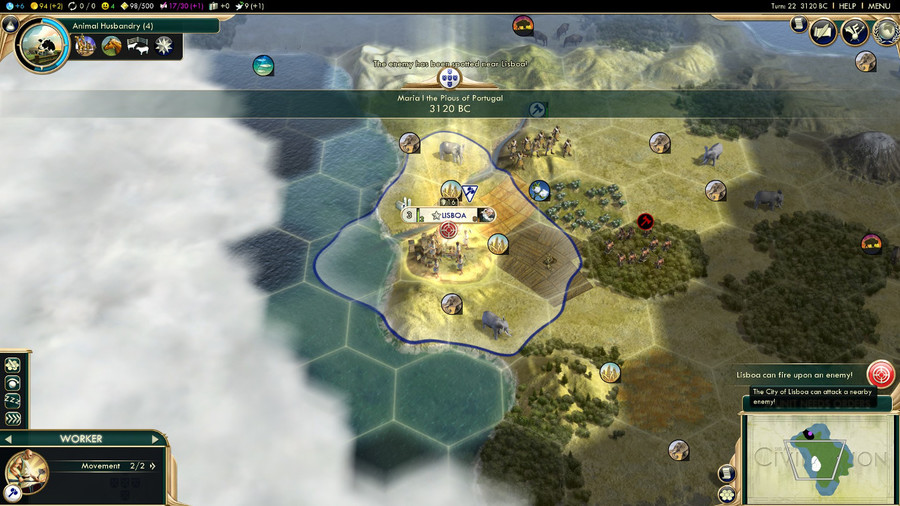
On the next turn, the Brute moves in tentatively, but still ends up in range of significant reprisal.
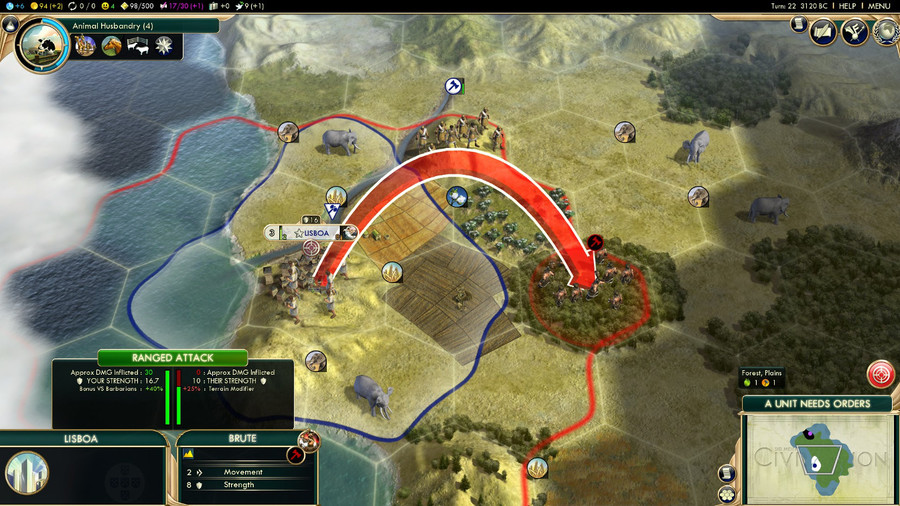
Lisboa's attack is weakened as units in forests gain +25% defence against ranged attacks, but it is still a decent source of damage.
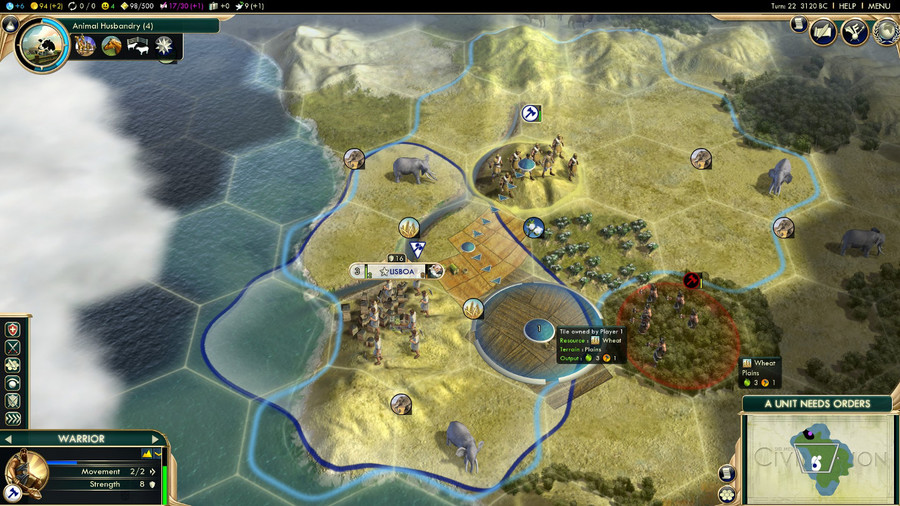
The Warrior moves in to block the Brute direct access to the Portuguese borders thanks to Zone of Control, and at this time we can take an interesting step towards maintaining our focus:

With the Warrior still in position, the Worker can move back onto the Wheat and continue construction of the Farm, resulting in a net loss of only 1 turn of construction. The Worker does not count as a military unit, so it can occupy the same space as a military unit, while still being protected by it. The only risk that bears is the possibility that the Warrior is killed and the Worker captured with the same action, but against a wounded Brute that is fairly unlikely.
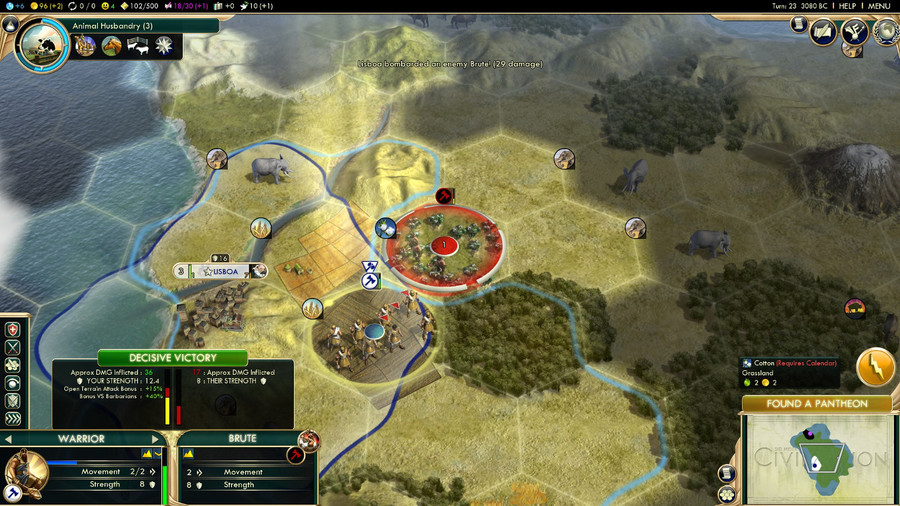
The Brute moves onto the Cotton resource where it is at a disadvantage, so Lisboa fires once more and the Warrior moves to finish it off (though RNG leaves the Brute alive for one more turn). However, something else of great import has occurred towards the bottom right:
We now have developed our Faith enough to create our Pantheon.
The Pantheon is a minor bonus given to a Civ early in its Faith generation cycle, and takes the form of a bonus granted to a City depending on the Pantheon chosen.
Only one of any given type of Pantheon can be chosen in a game, so as we have the first Pantheon, we have the choice of any of the bonuses we like, per the following list:
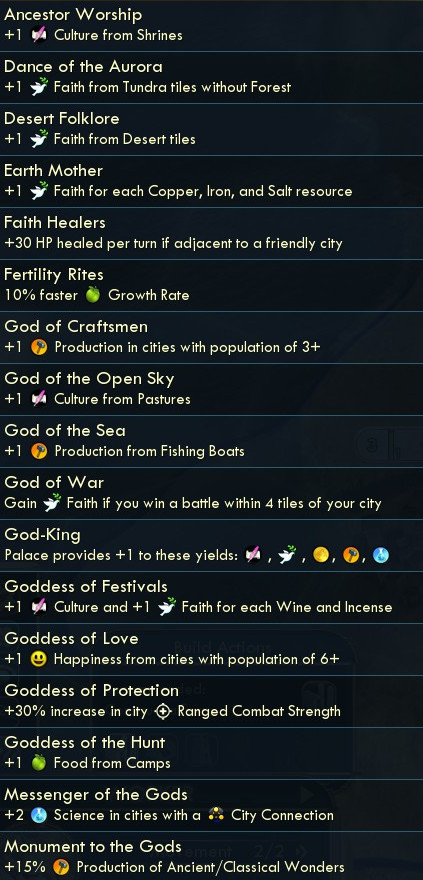

There is a lot to take in, but note that most Pantheon bonuses are contingent on having access to certain types of resources or terrain features. However, Dona Maria must listen to the voice of God first, and so I leave it to you to decide which Pantheon we follow. However, to that end, from the list above I have three suggestions:
Goddess of the Hunt grants +1 food from Camps, and Camps can be created upon researching Trapping. The relevant portion here is that Camps are used on tiles where there are Elephants, and God has decided to grace this continent with a lot of elephants, so the bonus will be quite relevant to us in the future.
One with Nature grants +4 Faith from Natural Wonders, which are relatively uncommon, but given that we will be attempting to add Mt. Kilimanjaro to our borders fairly soon, it may make sense to pursue this path to make its inclusion even more significant.
Sun God grants +1 food to tiles with Citrus, Bananas, and Wheat, emphasis on Wheat. With this, Lisboa will gain even more food production and easily become one of the largest Capitals in the world.
You are free to choose any other bonus from that list, but these three probably make the most sense for our immediate situation.
However, we also have another matter that demands the attention and guidance of God: Where our society develops technologically.
With Animal Husbandry, our people will learn more of the nature of beasts that roam the land, but not yet how to capture them effectively for the bounty of their hides and bones. They also know of plants to cultivate for food, but know not yet how to grow plants for making cloth or rope. To that end, they need guidance on how they should proceed not only to survive, but to thrive.
How should we develop technologically when next given the opportunity?
Calendar allows us to build Plantations for access to the nearby Cotton resource, which will provide Gold and Happiness, and Stone Works which we will not have access to since Lisboa does not have any Stone or Marble resources nearby. More saliently, it also gives us the option of building Stonehenge, a Wonder which gives +5 Faith per turn and may be the greatest demonstration of Portuguese devotion.
Trapping gives us access to Camps which we will use to start hunting Elephants for their Ivory (more Gold, more Happiness), and allows construction of Circuses, which give Happiness at no maintenance cost provided there are Elephants or Horses within the city borders. Note that this choice also synergises with the Goddess of the Hunt Pantheon Bonus, so it is worth capitalizing on one with the other.
The thread is also free to make a case for any other Technology to research next, as with the Pantheon Bonus choice, but I am just indicating the options that I feel make the most sense for the time being.
Please cast your votes and decide our fate within 2 days, and I will see it through.
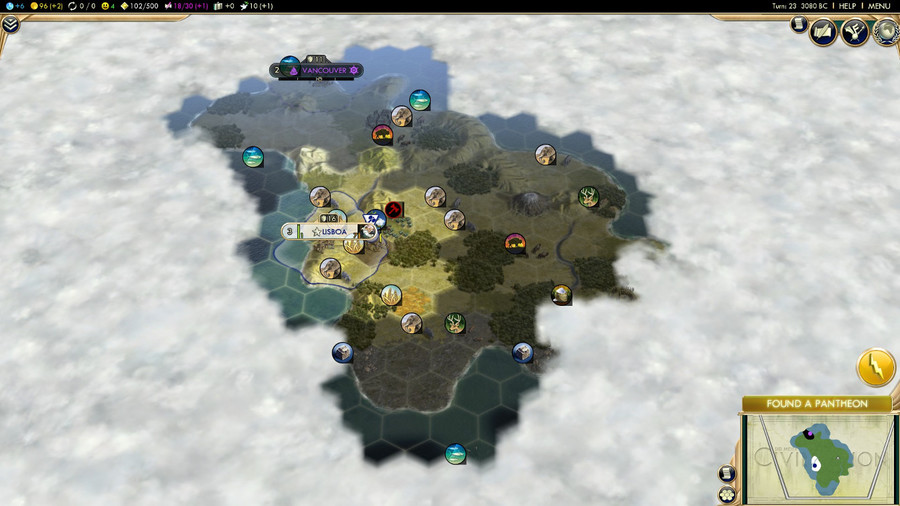
Finally, enjoy this zoomed-out screenshot of everything we have explored to date. I do not particularly like the alternate mapmode view, but if anyone would prefer to see that one please let me know. Also, let me know if I have shrunk the screenshots enough for comfortable viewing, and if not I will try the next batch as thumbnail screenshots to preserve their size and detail.
Até mais logo!